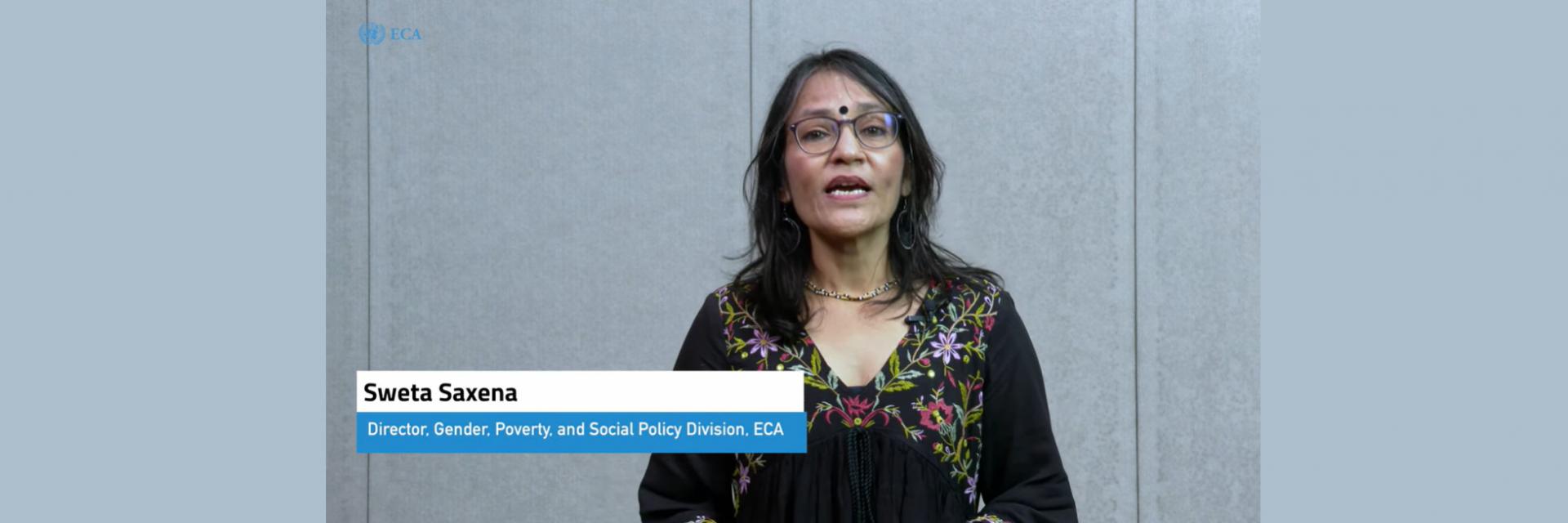Closing Remarks
Second Africa Review of the Global Compact for Safe, Orderly, and Regular Migration
Sweta Chaman Saxena
Director
Gender, Poverty, and Social Policy Division
United Nations Economic Commission for Africa
Thursday 10 October 2024
Your Excellencies,
Distinguished Delegates,
Colleagues
Today marks the conclusion of the three-day engagement on the second GCM Review in Africa. Our review included a stakeholder consultation meeting held on 8th October 2024, and discussions that focused on technical assessment of progress in implementing the 23 GCM objectives across the 4 IMRF thematic roundtable clusters. Over the three days, the deliberation provided member States an opportunity to reflect on the progress that has been achieved at the national and regional level in mainstreaming GCM in Africa.
I would like to commend the participants for their valued contributions to the discussions since Tuesday. Your inputs will be included in a report, which will be shared with you. The report will eventually form part of Africa’s submission to the GCM Secretariat and will inform the International Migration Review Forum (IMRF) in 2026.
It is not an exaggeration to say that we have achieved the objectives of this meeting. We have heard from our Ministers, experts, delegates of governments, and concerned citizens about what their countries are doing to implement the GCM. We have also heard from the experts on their own assessment of the status and progress of the implementation of the GCM in Africa. Some of the challenges, opportunities, gaps, especially in data, and emerging issues have also been discussed.
From our discussions, we all agreed that we need more resources and strengthened capacity to ensure effective implementation of the GCM. Some of the promising practices have given us hope that the objectives are achievable with concerted efforts and persistence. Now, we all have a shared responsibility to ensure the full implementation as a testament to our commitment to GCM, and more importantly to the migrants.
Excellencies, distinguished delegates, ladies, and gentlemen,
There is no denying that many African migrants continue to be subjected to discrimination, various forms of exploitation and abuse, xenophobia, poor wages, and sometimes even loss of life. Our efforts should ensure that migrants are protected, their rights are recognized, and their welfare is guaranteed.
Of course, this cannot be achieved without the continued cooperation and partnership with all relevant stakeholders. I’m glad that this whole-of-government and whole-of-society approach has been reaffirmed during this review process.
Friends, let’s not be complacent because a lot still needs to be done.
I will highlight six actions to support sustainable solutions to migration challenges.
First, we need an integrated approach that targets both migrants and host communities.
Second, we need to facilitate the pathway to labour mobility and skills certification.
Third, we need the African Union and the RECs to establish a comprehensive online platform and database that links skilled African workers with job opportunities across the continent’s labour markets.
Fourth, we need the portability of social protection, including pensions and health insurance, across borders.
Fifth, we need the Member States to understand the push factors for migration such as macroeconomic instability, conflicts, climate change, unemployment, and find solutions for those.
Lastly, we need more comprehensive data in order to formulate effective migration policies and strategies.
At ECA, we are ready to strengthen our collaboration with Member States, RECs, the UN family, and all stakeholders in accelerating the free movement of people as stated in the AfCFTA and in producing analytical work that would inform all stakeholders that are championing migration agenda in the continent.
Finally, I am grateful for the Government of Ethiopia for hosting this event. I would also like to acknowledge the immense contributions of our partners: IOM-Special Liaison Office, the AUC, The Global UN Migration Network, The UN Family, my colleagues at ECA, and the many teams that have worked tirelessly behind the scenes to ensure the success of this meeting.
THANK YOU

